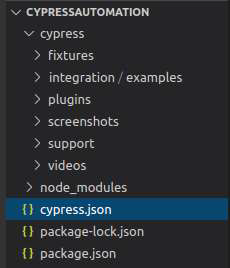
- Cypress - Home
- Cypress - Introduction
- Cypress - Architecture and Environment Setup
- Cypress - Test Runner
- Cypress - Build First Test
- Cypress - Supported Browsers
- Cypress - Basic Commands
- Cypress - Variables
- Cypress - Aliases
- Cypress - Locators
- Cypress - Assertions
- Cypress - Text Verification
- Cypress - Asynchronous Behavior
- Cypress - Working with XHR
- Cypress - jQuery
- Cypress - Checkbox
- Cypress - Tabs
- Cypress - Dropdown
- Cypress - Alerts
- Cypress - Child Windows
- Cypress - Hidden Elements
- Cypress - Frames
- Cypress - Web Tables
- Cypress - Mouse Actions
- Cypress - Cookies
- Cypress - Get and Post
- Cypress - File Upload
- Cypress - Data Driven Testing
- Cypress - Prompt Pop-up Window
- Cypress - Dashboards
- Cypress - Screenshots and Videos
- Cypress - Debugging
- Cypress - Custom Commands
- Cypress - Fixtures
- Cypress - Environment Variables
- Cypress - Hooks
- Cypress - Configuration of JSON File
- Cypress - Reports
- Cypress - Plugins
- Cypress - GitHub
- Cypress Useful Resources
- Cypress - Quick Guide
- Cypress - Useful Resources
- Cypress - Discussion
Cypress - Environment Variables
We can define environment variables that can be globally declared for the test automation framework and all the test cases can access it. This type of customized environment variable can be stored in the cypress.json file within our project.

Since, a customized variable is not exposed by default configurations from Cypress, we have to mention the key as "evn" in the cypress.json file and then, set the value.
Also, to access this variable in the actual test, we have to use the Cypress.env and pass the value declared in the json file.
Implementation in cypress.json
The implementation of commands for environment variables in cypress.json format is as follows −
{
"projectId": "fvbpxy",
"env" :
{
"url" : "https://www.google.com/"
}
}
Implementation of Actual Test
The implementation of actual test for environmental variables in Cypress is as follows −
describe('Tutorialspoint Test', function () {
// test case
it('Scenario 1', function (){
// launch application from environment variable
cy.visit(Cypress.env('url'))
cy.getCookies()
cy.setCookie('cookie1', 'value1')
});
});
Execution Results
The output is as follows −

The output logs show the URL launched which has been set as a customized environment variable from the cypress.json file.
Configure Environment Variables
We can configure or modify the environment values from the command line with the flag --env.
To run a particular file (for example: Test1.js) with URL: https://accounts.google.com in a headed mode, the command shall be as follows:
./node_modules/.bin/cypress run --spec cypress/integration/examples/Test1.js -- env url=https://accounts.google.com headed
If we have a value set for the environment variable url in the cypress.json file, which is different from the value set from the command line, Cypress shall give preference to the value set from the command line.